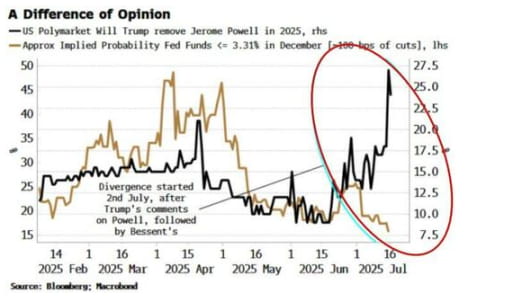Written by: Long Yue, Wall Street Journal
Despite increasing rumors of Trump firing Federal Reserve Chairman Powell, the two major 'barometers' of the financial market have given completely different signals.
Data shows a clear divergence between the prediction market and the interest rate market regarding Powell's future. The latest development is that Wall Street Journal reported that Powell will be interviewed on July 16 (Wednesday), and Trump has drafted a letter for his dismissal. This news once again drove up the betting odds on the prediction market platform Polymarket regarding 'Powell being dismissed in 2025.'
However, the level of concern in the interest rate market about Powell's early departure is significantly lower than the probabilities shown on the Polymarket betting platform. The interest rate market refers to the interest rate derivatives market, particularly the federal funds futures market, which reflects expectations for future Federal Reserve interest rates through trading prices.
Specifically, after the release of stronger-than-expected employment data in the U.S., the interest rate market actually reduced its bets on rate cuts. Currently, the interest rate market expects the Federal Reserve to cut rates by 43 basis points before the end of the year, down from 67 basis points at the end of June. More crucially, U.S. Treasury Secretary Mnuchin previously revealed in an interview that he did not fully support President Trump's sharp comments on the Federal Reserve, and his more moderate statements provided a stabilizing anchor for the interest rate market.
Thus, participants in the prediction market continue to reinforce Trump's 'dismissal rhetoric,' while traders in the interest rate market choose to trust Mnuchin's cautious stance and economic data indicating that inflation still has upward risks.

The chart shows the divergence between the interest rate market and the prediction market
The market's divisions are widening
In fact, the prediction market and the interest rate market began to diverge from early July.
Before early July, the implied probability of rate cuts in the interest rate futures market was largely in line with the odds on Polymarket regarding Powell's dismissal. However, this correlation was broken on July 2.
On July 2, Trump publicly called for Powell's resignation, and the related betting odds on Polymarket subsequently rose. However, at the same time, the short-term interest rate market was largely unaffected. Additionally, the employment data released on July 3 was stronger than expected, leading to a sell-off in the interest rate market as traders began to lower their expectations for rate cuts. On the same day, Treasury Secretary Mnuchin, in an interview, refused to fully endorse Trump's remarks about the Federal Reserve. His statements further reinforced the market's cautious sentiment. Since then, the two curves have moved in different directions.
According to Bloomberg macro strategist Simon White, prediction markets typically take political rhetoric as a wind vane, while interest rate markets pay more attention to economic fundamentals and policy signals.
Interest rate market pricing logic: Data and signals take precedence
The performance of the interest rate market clearly indicates that traders tend to filter out political 'noise' and focus on economic 'signals.' Recent U.S. employment data suggests that the economy remains resilient and inflation faces upward risks, directly undermining the rationale for significant rate cuts by the Federal Reserve in the short term.
Data shows that the interest rate market currently expects the Federal Reserve to cut rates by 43 basis points before the end of the year, which is far lower than the 67 basis points predicted at the end of June.
The core driving force behind this change, apart from economic data, is Treasury Secretary Mnuchin's stance. As a key figure connecting the White House and financial markets, his more moderate remarks have been interpreted by the market as an important signal of policy continuity, tempering Trump's aggressive rhetoric.
However, strategist Simon White pointed out that if any market participant believes that Trump's political intentions will ultimately prevail and successfully install a more 'dovish' Federal Reserve chairman, then Polymarket's odds might be closer to the truth.

